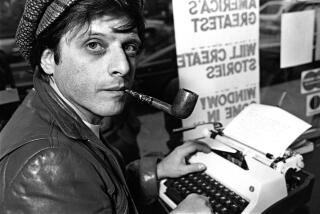Henry Carlisle dies at 84; author, translator helped bring Solzhenitsyn’s work to Western audiences
Henry Carlisle, a San Francisco author, translator and former editor who with his wife helped bring two works by Alexander Solzhenitsyn to Western audiences, has died. He was 84.
Carlisle died of complications from pneumonia July 11 in San Francisco, said his son, Michael.
Called a “literary statesman” by USC professor and former California state librarian Kevin Starr, Carlisle had a wide-ranging career in American letters that began in the 1950s, when he was an editor for Albert Camus. He championed Soviet dissident writers as a member of PEN American Center, the literary and human rights group that he led as president in the 1970s. He mentored aspiring writers as a teacher at the Squaw Valley Writers Conference.
Carlisle wrote six novels, including a satire on American-Soviet relations during the Cold War and a work of historical fiction based on the same events that inspired Herman Melville’s “Moby Dick.”
Through his wife, Olga Andreyev Carlisle, he came to play an important role in publishing Solzhenitsyn’s work. A descendant of a Russian literary family, she became Solzhenitsyn’s representative in America after meeting him during a trip to the Soviet Union in 1967. Carlisle helped his wife find a translator and publisher for two manuscripts smuggled out of the Soviet Union by her relatives: “The First Circle,” a novel based on Solzhenitsyn’s experiences in a special Soviet prison camp in the late 1940s, and “The Gulag Archipelago,” his masterful expose of the Soviet forced labor camp system.
Their relationship with the celebrated Russian author ended rancorously despite the books’ success. Solzhenitsyn accused them of caring more about profiting financially from the arrangement than producing competent translations of his work. After he was expelled from the Soviet Union in 1974, Solzhenitsyn said his exile was due to the Carlisles’ delays in publishing the first volume of his “Gulag” epic and criticized them in his memoir, “The Calf and the Oak,” as “dry, mercenary people of Western education.”
Although he was not privy to the communications between Solzhenitsyn and the Carlisles, Solzhenitsyn biographer Michael Scammell suggested that the dissident writer may have been unfair in his criticisms. Scammell, who oversaw the translation of “Gulag,” said of the Carlisles: “In their defense, when [‘Gulag’] was sent out, there were no orders saying, ‘Get this translated for immediate publication.’”
As for the portrayal of the Carlisles as “mercenary,” Scammell said Solzhenitsyn “was a very difficult character” who often “jumped to conclusions about Western greed” that may have been unfounded.
Olga Carlisle defended their actions in her own book, “Solzhenitsyn and the Secret Circle” (1978). She and her husband also filed a $2-million libel suit against Solzhenitsyn, but it was dismissed by a judge who said Solzhenitsyn’s opinions of the Carlisles were protected speech.
Despite Solzhenitsyn’s attacks on him and his wife, Carlisle held to his view that the 1970 Nobel Prize winner was one of the world’s most important writers. “He felt that to the dying moments,” Michael Carlisle said. “He did not regret the work they had done.”
Born in San Francisco on Sept. 14, 1926, Carlisle was the son of a mining engineer and great-grandson of a Nantucket whaling merchant. After serving in the U.S. Naval Reserve, he studied poetry in Paris, where he met his wife. He later returned to the U.S. to complete a bachelor’s and master’s degree at Stanford University, where he was a student of writer Wallace Stegner.
During the 1950s he was an editor at Alfred A. Knopf and Rinehart & Co. in New York. At Knopf he helped edit the English translation of Camus’ “The Myth of Sisyphus.” He also co-founded a publishing house, Purdy, Carlisle & Dodds, serving as editor and publisher in 1960-61 before devoting himself to writing novels.
His first book, the Cold War satire “Ilyitch Slept Here,” was published in 1965. It was followed by another satire, “The Contract” (1968), and the historical novels “Voyage to the First of December” (1972), “The Land Where the Sun Dies” (1975) and “The Jonah Man” (1984). With his wife, he also wrote “The Idealists” (1999), a novel set in revolutionary Russia.
As a member of PEN he helped lead a campaign in support of Andrei Amalrik, a Russian dissident who was imprisoned in 1970 for writing “Will the Soviet Union Survive Until 1984?,” an essay predicting the collapse of that country. Carlisle was president of PEN in 1976-77.
In 1978, after living in Connecticut for several years, he and his wife settled in San Francisco, where he joined a Bay Area literary circle that included Oakley Hall, Herbert Gold, Niven Busch and Herb Caen.
In addition to his wife and his son, he is survived by a brother, Miles.
More to Read
Start your day right
Sign up for Essential California for the L.A. Times biggest news, features and recommendations in your inbox six days a week.
You may occasionally receive promotional content from the Los Angeles Times.





















































